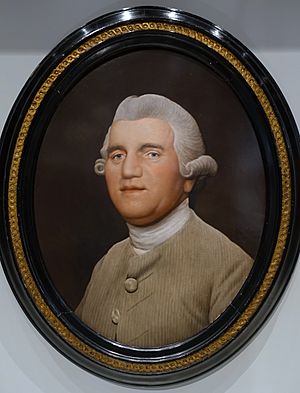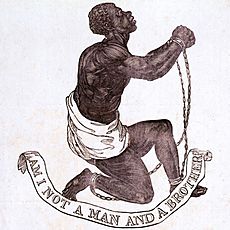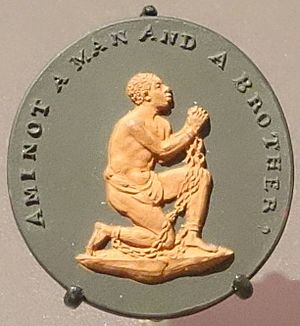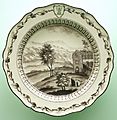Josiah Wedgwood facts for kids
Quick facts for kids
Josiah Wedgwood
|
|
|---|---|

Josiah Wedgwood by George Stubbs, 1780, enamel on a Wedgwood ceramic tablet
|
|
| Born | 12 July 1730 |
| Died | 3 January 1795 (aged 64) Etruria, Staffordshire, England
|
| Resting place | Stoke-on-Trent, England |
| Occupation | Potter, entrepreneur |
Josiah Wedgwood (born July 12, 1730 – died January 3, 1795) was a famous English potter and entrepreneur. An entrepreneur is someone who starts and runs a business. He started the well-known Wedgwood company. Josiah Wedgwood is often seen as the person who brought modern factory methods to making pottery. He made pottery cheaper by dividing the work into many small steps. This helped his pottery sell all over Britain, Europe, and America.
In the late 1760s and early 1770s, people loved classical styles. This helped Wedgwood sell his goods. Rich people bought his expensive pottery. He also sold cheaper sets to others. Every new type of pottery Wedgwood made, like green glaze or black basalt, was quickly copied. He was great at making pottery and also at selling it. His shops in London let people see all his tableware.
Wedgwood is known as the inventor of modern marketing. He helped meet the demands of the "consumer revolution." This was a time when more people had money to buy things. He was a pioneer in many sales methods. These included sending mail directly to customers, money back guarantees, and salespeople who traveled. He also used display boxes, self-service stores, and free delivery. He even offered "buy one get one free" deals and printed catalogs.
Josiah Wedgwood was also a strong supporter of ending slavery. He is famous for his "Am I Not a Man And a Brother?" anti-slavery medallion. He was part of the Darwin–Wedgwood family. He was also the grandfather of the famous scientist Charles Darwin and his wife, Emma Darwin.
Contents
Biography of Josiah Wedgwood
Josiah Wedgwood was born in Burslem, Staffordshire, England. He was the eleventh and last child of Thomas Wedgwood and Mary Wedgwood. His father was also a potter. By the age of nine, Josiah was already a skilled potter.
Early Life and Challenges
When he was a child, Josiah got smallpox. This sickness left him with a weak knee. Because of this, he could not work the foot pedal of a potter's wheel. So, he focused on designing pottery instead. Other potters then made his designs. The pottery from his family's business was cheap and not very good quality.
In his early twenties, Wedgwood worked with Thomas Whieldon. Whieldon was a very famous English pottery-maker. They became business partners in 1754. Wedgwood also started studying chemistry. He wanted to understand how fire, clay, and minerals worked together. He hoped to make better clays and glazes for pottery.
Starting His Own Business
Wedgwood used his skills and knowledge to open one of the first pottery factories. It was called Ivy Works, in Burslem. This area is now part of Stoke-on-Trent.
He was very interested in science and technology. He used new ideas to make high-quality pottery. He became famous for making pottery for royalty, like kings and queens. This made him very rich. He used his money to help his city. For example, he invested in canals, which helped businesses.
Friends and Family Connections
Wedgwood became friends with Erasmus Darwin. Darwin was an important scientist and inventor. In 1780, Wedgwood and Darwin became business partners. Later, Wedgwood's son married Darwin's daughter. Their child was Charles Darwin, the famous naturalist. Wedgwood and Darwin were also members of the 'Lunar Society.' This was a group of important scientists, thinkers, and business people.
Royal and International Orders
By 1763, Wedgwood was getting orders from the highest people in Britain. One of these was Queen Charlotte. Wedgwood convinced her to let him name the pottery she bought "Queen's Ware."
In 1773, Empress Catherine of Russia ordered the Green Frog Service from Wedgwood. You can still see this pottery in the Hermitage Museum today. She had also ordered the Husk Service in 1770, which is now in Peterhof.
Later in his life, Wedgwood really wanted to copy the Portland Vase. This was a dark blue and white glass vase from ancient times. He worked on this project for three years. In 1789, he finally made a copy he was happy with.
Fighting Against Slavery
Along with his friends in the Lunar Society, Wedgwood worked to end slavery. He made special medallions that asked for slavery to stop. These medallions became very popular. Selling slaves became illegal in Britain in 1807. Having slaves became illegal in 1833.
Josiah Wedgwood died in Etruria, Stoke-on-Trent, in 1795.
He was chosen to be a member of the Royal Society in 1783. This was because he invented a pyrometer. This device could measure the very high temperatures inside kilns, which are ovens used for firing pottery.
He was an active member of the Lunar Society of Birmingham. Meetings were often held at Erasmus Darwin House. He is remembered on the Lunar Society Moonstones in Birmingham.
Family Life
In January 1764, Josiah Wedgwood married Sarah Wedgwood. She was his third cousin. They had eight children together:
- Susannah Wedgwood (1765–1817) married Robert Darwin. She became the mother of the famous English naturalist Charles Darwin. Charles later married his cousin, Emma Darwin.
- John Wedgwood (1766–1844) joined the family business. He was more interested in gardening.
- Richard Wedgwood (1767–1768) died as a child.
- Josiah Wedgwood II (1769–1843) was the father of Emma Darwin. Emma was Charles Darwin's cousin and wife.
- Thomas Wedgwood (1771–1805) had no children. He is known for being a pioneer in photography.
- Catherine Wedgwood (1774–1823) had no children.
- Sarah Wedgwood (1776–1856) had no children. She worked hard to end slavery. She helped start the Birmingham Ladies Society for the Relief of Negro Slaves. This was the first anti-slavery group for women.
- Mary Anne Wedgwood (1778–86) died as a child.
Josiah Wedgwood's Legacy and Influence
Josiah Wedgwood was one of the richest business people of the 1700s. He made goods that met the needs of the "consumer revolution." This was a time when more people had money and wanted to buy things. This growth helped power the Industrial Revolution in Britain. He is seen as a pioneer of modern marketing. He used new ideas like sending mail directly to customers and money back guarantees. He also used traveling salespeople with sample boxes. He introduced self-service shopping, free delivery, and "buy one get one free" offers. He also created illustrated catalogs.
Historian Tristram Hunt described Wedgwood as a "difficult, brilliant, creative entrepreneur." He said Wedgwood's drive and gifts changed how people work and live.
Wedgwood was a friend and business rival of another potter, John Turner the elder. Sometimes their works have been confused. To help his buyers from other countries, Wedgwood hired clerks who spoke French, German, Italian, and Dutch. He answered their letters in their own languages.
Josiah Wedgwood was the fifth generation in his family to be a potter. His family's pottery tradition continued for another five generations. The Wedgwood company is still a famous name in pottery today. "Wedgwood China" is sometimes used to describe his special Jasperware. This is colored pottery with raised white decorations.
Wedgwood's Fight Against Slavery
Wedgwood was a very important abolitionist. This means he worked to end slavery. His friendship with Thomas Clarkson made him interested in the cause. Clarkson was a campaigner and historian of the British movement to end slavery. Wedgwood made many small medallions that showed the seal for the Society for Effecting the Abolition of the Slave Trade. He gave these out widely, and they became a very popular image.
The Wedgwood anti-slavery medallion was the most famous picture of a Black person in all of 18th-century art. The design of the medallion was probably made by William Hackwood or Henry Webber. They were model makers at his factory.
From 1787 until he died in 1795, Wedgwood actively worked to end slavery. His Slave Medallion helped bring public attention to the idea of ending slavery. Wedgwood made the design into a cameo. It showed a black figure against a white background. He gave hundreds of these to the anti-slavery society to give away.
The design on the medallion became very popular. It was used in other ways too. Large copies were painted to hang on walls. It was even used on clay tobacco pipes.
Images for kids
-
Etruria Hall, the family home, built 1768–1771 by Joseph Pickford. It was restored as part of the 1986 Stoke-on-Trent Garden Festival and is now part of a four-star hotel.
-
Vase on stand with inverted Neck, Josiah Wedgwood and Sons and Thomas Bentley, before 1780, black basalt. Chazen Museum of Art, Madison, Wisconsin.
-
Teapot, Wedgwood 'caneware', c. 1780–1785. Nelson-Atkins Museum of Art, Missouri.
-
Wedgwood tea and coffee service, 1765, on display at the Victoria and Albert Museum, London. Wedgwood's creamware was hugely popular, as a cheaper equivalent of porcelain.
-
Wedgwood, 1774, creamware. Plate from the Frog Service for Catherine II of Russia, Brooklyn Museum, New York
-
Horse Frightened by a Lion Jasperware by Wedgwood and Thomas Bentley, after George Stubbs, 1780.
See also
 In Spanish: Josiah Wedgwood para niños
In Spanish: Josiah Wedgwood para niños
 | Delilah Pierce |
 | Gordon Parks |
 | Augusta Savage |
 | Charles Ethan Porter |









